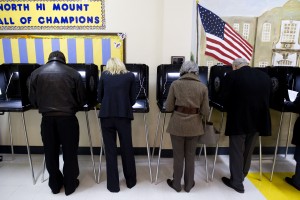
By PAUL J. WEBER
Associated Press
AUSTIN, Texas (AP) — Republicans decided who was more conservative while Democrats sought to galvanize new voters as Texas held a first-in-the-nation primary Tuesday that could push the state farther right, even as the left looks to stake new claims.
Six of Texas’ top jobs are open after GOP Gov. Rick Perry decided not to run again following a record 14 years in office, prompting a stampede of 26 Republicans candidates for various stepping stones to higher office. Democrats set on breaking the nation’s longest losing streak in races for statewide office meanwhile hoped charismatic gubernatorial hopeful Wendy Davis would turn out long-dormant voters.
“If people don’t start supporting the Democratic Party and voting as a Democrat, instead of being a Democrat voting in the Republican primary, then we’re never going to win races and we’re never going to establish ourselves as a serious party here,” said Janet Veal, 43, a Texas Tech student adviser who cast a Democratic ballot in Lubbock.
That possibility, and the rising influence of tea party firebrand U.S. Sen. Ted Cruz, has Texas Republicans flanking farther right this primary season. Some have blasted an “invasion” of immigrants coming across the Texas border, where immigration arrests have almost tripled in recent years but remain at about one-third of their historic highs. Others pledged to further tighten some of the nation’s strictest abortion laws and doubled down on the state’s gay marriage ban — one of several state bans recently ruled unconstitutional by federal courts.
“I think we need to bolster the border security and get tougher on immigration,” 38-year-old conservative Republican Glendon Paulk said after voting in Lubbock. “I’m all for people who come over here legally but the illegal immigrants, it doesn’t make sense for them to get a break while we’re working and having to pay taxes.”
Frigid weather greeted some voters with a dangerous drive to the polls. Austin locations opened late because of icy conditions and extended voting for two hours. Turnout was light in many places, with election workers seen knitting or reading a newspaper in between voters’ sporadic arrivals.
Among those on the ballot Tuesday was a new member of the Bush dynasty: George P. Bush, the nephew of former President George W. Bush and son of former Florida Gov. Jeb Bush, making his political debut by running for land commissioner.
Six of Texas’ top offices lack an incumbent; the last time Texas had so many open statewide seats was 2002, when Perry won his first full term. While Democrats are running mostly unopposed in their primaries, crowded fields in the Republican races for attorney general, comptroller and commissioners for agriculture and railroads make May runoffs likely.
Davis’ bid for governor headlines a roster of underdog Democrats girding instead for the Nov. 4 general election.
That’s the only day that matters to Davis and her Republican opponent, Attorney General Greg Abbott, in the year’s marquee showdown. Neither has a competitive primary, leaving Davis poised to become the first female gubernatorial nominee in Texas since Ann Richards in 1994.
Abbott was set to become the GOP’s first new gubernatorial nominee other than Perry to appear on the ballot since George W. Bush in 1998.
Beverly Hanson — who was among a handful of people who had voted at a Houston elementary school on a cold, rainy day — said women’s issues are a key component of the election.
“And that means Wendy Davis,” the 68-year-old retired teacher said, later explaining, “She’s not one of the old boys. In Texas, we have for so many years had the old boys in office.”
Hanson said Davis has an uphill battle against Abbott but believes the attorney general erred by campaigning with shock rocker Ted Nugent, who called President Barack Obama a “subhuman mongrel,” a comment for which he later apologized.
“It just an example of Republicans having a narrow perspective of what Texas is,” Hanson said, adding, “It will be a fight.”
Unlike Davis and Abbott, few other Texas candidates have the luxury of uneventful primaries.
Almost all are on the Republican side, where candidates have wooed voters with vows to emulate Cruz’s no-compromise style. Even U.S. Sen. John Cornyn and U.S. Rep. Pete Sessions, two of the state’s most powerful Republicans, have spent money campaigning against longshot challengers who say the incumbents have grown too moderate in Washington.
Changes are far more likely in Austin. Republican Lt. Gov. David Dewhurst, who lost to Cruz in the U.S. Senate race in 2012, appears headed for his first runoff in 11 years for the state’s No. 2 job, which doubles as the state Senate president and exerts considerably more influence than elsewhere in setting the legislative agenda. The race has been the nastiest and most competitive this primary season.
Ralph Kramer, 70, a semi-retired petroleum engineer from The Woodlands who described himself as more conservative than most Republicans, said he didn’t like the tone of Dewhurst’s recent campaign against challenger state Sen. Dan Patrick. Kramer described political ads as “just a way to lie, exaggerate.”
“And I don’t like a dirty campaign,” he said.
Illinois holds the nation’s next primary March 18, followed by a flood of state primaries in May and June.


